
Lawyer and Management Consultant, Ato Conduah is seeking answers on the recent Minerals Income Investment Fund, between Government of Ghana and the Royalties Company. He is questioning the propriety of the GoG and the Ministry of Finance in entrusting such sovereign wealth into the hands of an off-shore company, who apart from its unknown track record, exposes its related-parties who seem connected to the Ministry of Finance and GoG.
In a recently published statement on his Facebook page, Mr. Conduah wondered why government had kept mute on the raging rumors and speculations regarding certain aspects of the deal
According to him, although the agreement has already been passed by parliament Ghanaians deserve explanations considering the Presidents admonishing for them to be citizens and not merely spectators.
Below is a summary of the agreement and 12 questions he refers to as Rigorous Analytics Paper 2:
Fellow Ghanaians, I have gone through a restless night and day studying the Agreement on our Minerals Income Investment Fund, between GoG and the Royalties Company.
The summary is as follows:
1. The fund management company is incorporated in Jersey, a tax haven in the UK, with some Ghanaian shareholders. The directors of this company, according to what their lawyers believe, cannot be removed by the state, even if found brazenly incompetent?
2. The GoG has 51% interest, while fund managers (FM) have 49% interest, according to the Agreement.
3. This fund management arrangement is carefully routed through a Special Purpose Vehicle (SPV) – created exclusively to accommodate current FM to the exclusion of any other company, without recourse to our Public Procurement Act.
4. The fund managers are to float shares for raising $1billion on the London Stock Exchange (LSE) for GoG.
5. The selected law firms include a UK firm, a notable Ghanaian Law firm, and the law firm of a political insider. GoG through the Ministry of Finance is said to have expended Ghc10million for the drafting, review and amendments to the Agreement.
6. The details of this Agreement creates the impression that, someone has created a novel way of hedging our minerals royalties from tax-paying mining and minerals companies in Ghana, against the raising of the $1billion from the LSE.
Some have raised some prudential questions on the propriety of GoG and the Ministry of Finance entrusting such sovereign wealth into the hands of an off-shore company, who apart from its unknown track record, exposes its related-parties who seem connected to the Ministry of Finance and GoG.
1. Why did we choose an SPV instead of using the standard procedure required for all public procurement activities under our Public Procurement Act?
2. Why did the selection of law firms go through the requirements of the Procurement Act, and the appointment of fund managers go through an SPV?
3. Is it true that our smart MoF did not realize the apparent conflict of interest in selecting the law firm of a politically exposed person who has interest in the Royalties Company?
4. Did it appear to MoF that the related-parties involved in Royalties Company are said to be fronting for an investment house known to the MoF?
5. How does the selection and appointment comply with the standard of public accountability and transparency under our commercial and investment laws?
6. How does it appear proper when a firm reviewing the investment agreement for GoG and MoF has an interest in the company appointed to fund manage our minerals royalties?
7. What standard of fund management knowledge and expertise was applied in choosing an SPV for sovereign funds, especially when choosing an offshore company that does not possess any track record or previous experience in the subject matter?
8. Can it be true that the SPV was solely created as a decoy to avoid public scrutiny, and as a front for a related investment house, with the objective of profiteering from our minerals royalties, under the pretext of floating it on the LSE?
9. Can someone help Ghana by explaining why the fund managers are to benefit 49% as against entire Ghana’s 51%? Is this another PDS?
10.Did MoF think that by using a UK law firm to join Ghanaian firms to review the Agreement, MoF will pass the public accountability and transparency test? If so, why hasn’t the full agreement gone before the Finance Committee of Parliament for its deliberation and approval?
11. The involvement of related-parties rather reveals the intent and destination of Ghana’s sovereign minerals royalties – into private pockets? Can I be worried what our intelligent Vice President thinks about this? Would anyone respectfully oblige me with an educated response?
12. Bad governance is not only using state resources and appointments to dignify ethnicity, or to “de-dross” younger females to bring total nonsensical vituperations in the media. Good governance requires keeping your commitment to protect the public purse, without allowing related parties to plunder state wealth! Sovereign funds are to be used for inter-generational investments that must outlive the current generation, so how will Ghana achieve this goal by allowing the filtration of state funds into private pockets?
The question was put in the Rigorous Analytics Paper 1, what is the process for finding the derivative of a function? The correct answer is differentiation from mathematics. In sovereign wealth investment marketing, creative and long-term innovation of an investment vehicle can be an effective differentiator. But not when its dividends innure to private people.
Differentiation in my own “investment economics 101” means finding the value of state royalties in contrived investments where y =x. At the point 0 when the fund manager, who has no track record runs out of ideas, dy divided by dx will give 2x raised to the power 2 minus 1.
Applying this in simple derivatives terms, after investing our royalties with the current inexperienced “shell” company, Ghana runs a risk when you factor-in the directors of the fund managers who cannot guarantee accountability because they cannot be removed, and at the point 0 when they run out of ideas, our state loses to the fund managers who would have gained twice what must innure to Ghana’s benefit.
In simplistic analysis, if I take your money to do a business and agree to share profits and risks in the ratio of 51:49, should anything un-toward happen to the capital, who loses? Is it the owner of the fund or the fund manager? This is why the competence and track record of the fund manager matters to cushion GoG against most of the risks associated with the business so that at the point 0, when the share values drop or are being traded-in for non-performance on the stock exchange, GoG does not pick further losses.
Our investment decisions must take into consideration the “Cobra Effects” principle, and our sovereign decisions must be processed through systems thinking. If you love Ghana, willfully scheming to profit on Ghana’s minerals royalties funds should not cross your mind. “Others have labored (since the time of John Mensah Sarbah and Jacob Wilson Sey to Paa Grant, JB Danquah and Kwame Nkrumah), and you share their glory, yours is to do exploits (today) to add to their gain, (so that) those who come after will tell (a better) story” (courtesy Adisco). “Nunquam non libeat quod tibis licetus” – let not that please you which is unlawful. Amen!
Ahotorfm 92.3 News




